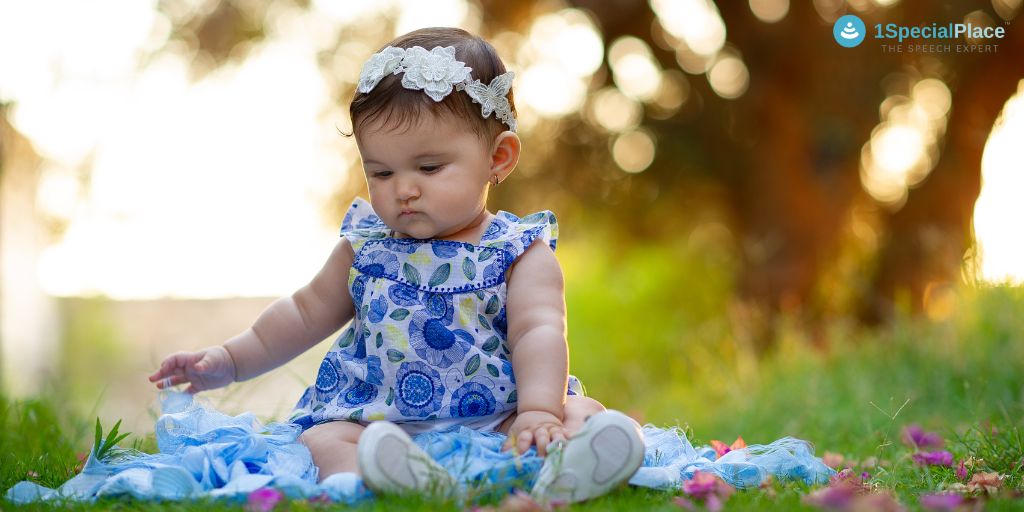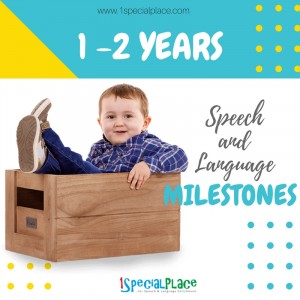
1-2 years: Speech and Language Milestones
1-2 years: Speech and Language Milestones

Speech and Language Milestones
During the second year, toddlers are moving around more, and are aware of themselves and their surroundings. Their desire to explore new objects and people also is increasing. During this stage, toddlers will show greater independence; begin to show defiant behavior; recognize themselves in pictures or a mirror; and imitate the behavior of others, especially adults and older children. Toddlers also should be able to recognize the names of familiar people and objects, form simple phrases and sentences, and follow simple instructions and directions.

Auditory skills
|
Speech
|
13- 18 Months
- Processes simple language
- Auditory memory of one item at the end of a phrase/sentence
- Discriminates between familiar phrases
- Follows one step directions that are
- familiar
- Identifies and associates more words to related objects, e.g. toys, body parts, food, clothing
- Imitates words heard
|
13-18 Months
- Imitates alternated vowels
- Approximates single words
- Uses most vowels in vocal play
- Uses more front consonants plosives [p, b, d], nasals [m, n], Uses fricative [h], Uses semivowel [w]
|
19-24 Months
- Auditory memory of 2 items
- Discriminates songs
- Comprehends a variety of phrases
- Discriminates descriptive phrases
- Follows a two step direction, e.g. Get your ball and throw it.
- Identifies by category
|
19-24 Months
- Approximates words
- Substitutes /w/ for /r/
- Uses suprasegmental features
- Most vowels and diphthongs present
- Consonants [k, g, t, ng] emerging
- Consonants [p, b, m, h, n, d] established – used in initial position in words
- In the medial and final positions, consonants are frequently dropped.
|

Language Comprehension
|
Language Expression
|
13- 18 Months
- Understands more new words each week
- Follows one step directions during play
- Understands simple where questions, e.g. Where’s daddy?
- Recognizes and demonstrates understanding of many
- Objects by pointing
- Understands more familiar phrases
- Begins to recognize names of various body parts, e.g. eyes, hands
- Enjoys rhymes
- Understands more simple questions
- Begins to understand longer phrases with key word in middle of sentence
- Develops category vocabulary
- Identifies more body parts
- Finds familiar object not in sight
- Understands 50 or more words
- Identifies some clothing items, toys and food
|
13-18 Months
- Uses 7 or more words consistently
- Uses voice and gesture to obtain desired object
- Continues to use jargon with more true words developing
- Incorporates pausing and intonation into jargon
- Imitates new words spontaneously
- Sings
- Jargon disappears
- Increases vocabulary, 10 or more meaningful words
- Decreases use of gesture – relies on talking to communicate
- Imitates words heard
- Asks for more
|
19-24 Months
- Completes two requests with one object
- Chooses two familiar objects
- Comprehends action phrases
- Points to a range of body parts, e.g. elbow, cheek
- Begins to understand personal pronouns – my, mine, you
- Recognizes new words daily
- Increases comprehension – decodes simple syntax
- By 24 months understands 250 – 300 words
|
19-24 Months
- Occasionally imitates 2 – 3 word phrases
- Uses new words regularly
- Increases expressive vocabulary to 30 words or more
- Attempts “stories” – longer utterances in jargon to get message across
- Begins to use own name when talking about self
- Uses possessive pronouns – mine
- May ask where questions Where car?
- By 24 months may use 2 – 3 word phrases with nouns, some verbs and some adjectives
|
Speech and Language Milestones
Social skills
|
Motor milestones
|
13- 18 Months
- Continues to develop eye contact with speaker for longer periods
- Takes turns as expressive language develops
- Plays fetching game
- Involves others by showing things, e.g. shoes/clothing during play
- Begins to understand “wh” questions
- Requests object or help from adult by gesturing and vocalizing
- Initiates vocal interaction
- Prefers to be with familiar people
- Shows caution with strangers
- Imitates other children
|
13-18 Months
Fine Motor Skills
- Holds and drinks from a cup using two hands
- Builds a tower of 2 blocks
- Makes marks with crayons
- Tries to turn pages of a board book
- Turns door handle
- Manipulates Snap Lock beads or similar
- Pulls off their shoes
- Puts small objects into large containers
Gross Motor Skills
- Crawls downstairs feet first
- Walks independently with feet wide apart
- Can sit themselves in a small chair
- Squats to pick up toys from the floor
- Moves between squatting, running, standing to play with toys
- Rolls and throws a ball
- Bends down from waist to pick up toys
- Enjoys push and pull toys while walking
- Carries a teddy bear when walking
- Rides a simple sit on toy
|
19-24 Months
- Begins to develop more self confidence and is happy to be with other people
- Initiates pretend play
- Responds to requests from adults
- Practices adult-like conversation about familiar themes
- Uses words to interact
- Requests information, e.g. What is this?
- Develops turn taking in conversation
|
19-24 Months
Fine Motor Skills
- Uses a spoon to feed themselves
- Will enjoy attempting fasteners like velcro, zips and poppers
- Puts on shoes
- Draws circles and dots
- Builds a tower of 5 blocks
- Begins to use a preferred hand
Gross Motor Skills
- Climbs on furniture
- Kicks a stationary ball
- Walks up and down stairs
- Puts together and pulls apart snap together toys
|
Speech and Language Milestones
Download worksheet for kids now
What you can do
- Your child will love to turn knobs and push buttons as this helps him to learn to use his muscles and also to feel that he can manage new things. Protect the TV and other appliances and give him his own toys with knobs and buttons to press.
- Your child will be interested in playing with simple puzzles.
- Your child will enjoy toys that link together, such as trains with carriages and stacking toys, hammer and peg sets, and filling and emptying containers.
- He/She will love to look at pictures, particularly if you name familiar objects and animals and allow him to turn the pages sometimes.
- Favorite conversations involve talking about what he is looking at, doing or feeling. Your child learns more words when you chat this way, rather than when you ask questions. Try to avoid questions that you already know the answer to. Instead of asking ‘what’s that?’ you might say ‘oh, it’s a yummy apple’.
- Play games where he has lots of opportunities to say ‘no’, such as ‘Is daddy under the bed?’
- Provide toys, such as plastic fruit, animals and cars, so he can learn about difference and sameness.
- Young children love to copy others and to dress up, and play with toys that allow them to copy household activity, for example telephone, dolls and washing up.
- Allow your child to play by himself at times without interference so that he learns to entertain himself. He will ask for help if he wants it.
To see more related videos to speech language delay:
Red flags:
Talk with your doctor or child health nurse if your child:
- Is tripping over her feet a lot and this is not improving
- Isn’t yet walking
- Cannot hold a spoon with enough purpose to get food into his/her mouth
- Can’t pick up small objects with a pincer grip
- Can’t build a tower of 3 to 4 bricks
- Is only using up to 20 single words consistently
- Doesn’t understand simple directions (this does not mean she will always do as you tell her)
- Often runs very far away (out of sight) or climbs extremely high without hesitation.
Download our App- Speech Doctor to detect if your child has a speech-language delay. Click on the image.

Speech and Language Milestones
Leave a reply if you liked this post. Subscribe here to receive tips and ideas for enhancing your child’s speech.
Check if your child has a speech delay.
Latest posts by Varsha Srivastava
(see all)





Leave a Comment
(0 Comments)